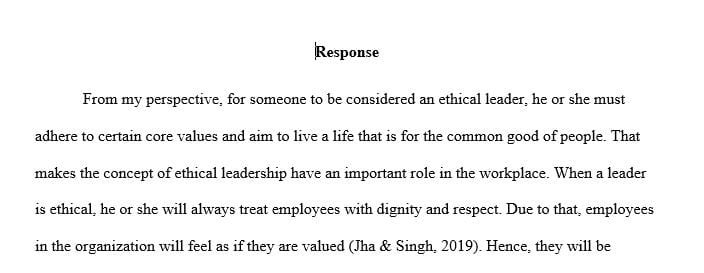Reflections on the integration of ethical leadership principles in organizational practice.
Read the posts of your fellow learners and post scholarly responses to two reflections on the integration of ethical leadership principles in organizational practice. Include text concepts, relevant research, and professional or practical experiences to support your responses.
Student post down below:
Collapse
Ethical leadership is guided by principals of service, honesty, respect and community building (Northhouse,2016). These principles are important to effective leadership because as a leader others look to you for guidance. In order for others to buy into common goals, they must trust that the leader vision and direction is good for the group and not self-serving.
Influence from the leader play a major role in establish the ethical climate of the organization (Northouse, 2016). Leadership ethics includes integrity, following all laws, adherence to employer policies and procedures and proper maintenance of all organizational policies. Leaders have the ethical responsibility to advocate for the clients, social change in the community empowerment, and to protest social injustice. A leader must be able to deal with interpersonal problems within the organization, leaders must be aware of social economic, and political issues, these can affect the organization. Relationships among people or organizations become incompatible or inconsistent when two or more of them desire a similar resource that is in short supply; when they do not share behavioral preference regarding their joint action; or when they have different attitudes, values, beliefs, and skills (Rahim, 2017).Answer preview to reflections on the integration of ethical leadership principles in organizational practice.
APA
254 words



